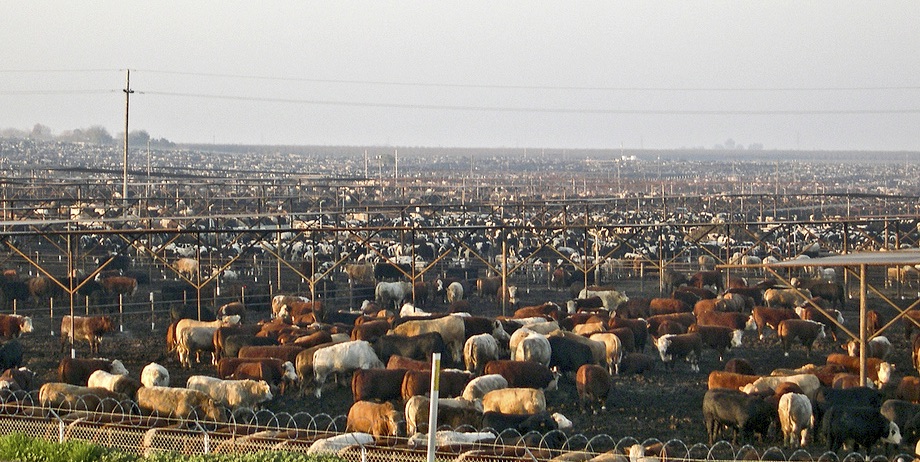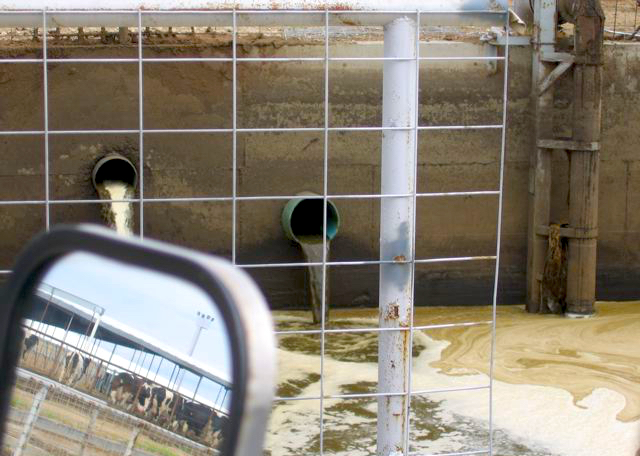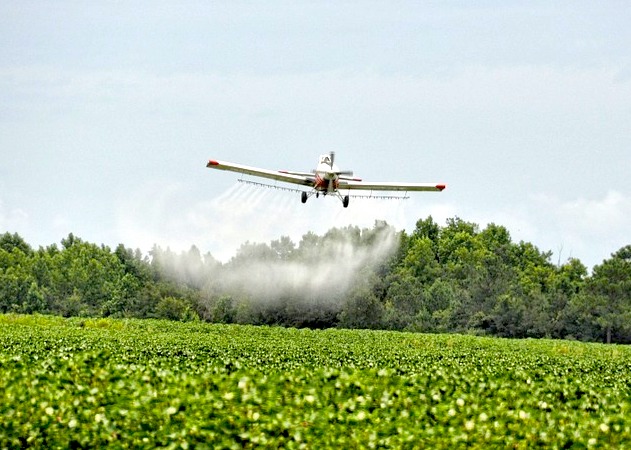
Your Food, Your Legislature: CAFO Regulations, Pesticide Ban Top Agenda
When it gavels into session on Monday, February 3rd, the 2020 interim session of the Oregon legislature is set to address a stunning, some would say impossible, roster of work in the 35 days it is legally allowed. From climate change to gun control to spending $1 billion in revenue—not to mention the threat of Republicans walking out to kill bills they're not happy with as they did last session—it's bound to be a bumpy ride.
Several bills affecting our food system are in play, including:
 New regulations on confined feeding operations (CAFOs) with more than 2,500 animals (SB 1513): On the heels of the catastrophic failure of Lost Valley Farm, a 30,000-cow mega-dairy, this bill seeks to establish more stringent regulations of new industrial animal operations. Specifically, it requires the Oregon Dept. of Agriculture (ODA) or the state Environmental Protection Agency (EPA) to confirm the facility has an adequate water supply to operate and that it will need to obtain a separate permit for spreading animal waste on the land surrounding the facility.
New regulations on confined feeding operations (CAFOs) with more than 2,500 animals (SB 1513): On the heels of the catastrophic failure of Lost Valley Farm, a 30,000-cow mega-dairy, this bill seeks to establish more stringent regulations of new industrial animal operations. Specifically, it requires the Oregon Dept. of Agriculture (ODA) or the state Environmental Protection Agency (EPA) to confirm the facility has an adequate water supply to operate and that it will need to obtain a separate permit for spreading animal waste on the land surrounding the facility.
According to Amy van Saun, a senior attorney for the Center for Food Safety (CFS), this bill is not adequate to address the problems raised by Lost Valley Farm. "The work group bill (similar to the bill proposed last session) does not go nearly far enough, and chipping away at the edges will not protect our community health and welfare from mega-dairies, including the new mega-dairy proposed at the infamous Lost Valley site. Further, we are concerned that the climate legislation again both exempts mega-dairies from controlling their methane emissions and creates a perverse incentive for people (especially from states with stronger controls) to set up or expand mega-dairies here, and to then sell dirty manure gas as 'renewable biogas' into the market," she said.
 Study groundwater contamination and implement improvement plan for Lower Umatilla Basin Groundwater Management Area (SB 1562): Some drinking water wells in the federally designated Groundwater Management Area (GWMA) in Umatilla and Morrow Counties are polluted with nitrates over the federal maximum allowable limits. Blamed on agricultural effluents, the area is the site of the state's two largest factory farm dairies—the 70,000-cow Threemile Canyon Farms and the not-yet-permitted 30,000-cow Easterday Farms Dairy, the original location of the now-shuttered Lost Valley Farm.
Study groundwater contamination and implement improvement plan for Lower Umatilla Basin Groundwater Management Area (SB 1562): Some drinking water wells in the federally designated Groundwater Management Area (GWMA) in Umatilla and Morrow Counties are polluted with nitrates over the federal maximum allowable limits. Blamed on agricultural effluents, the area is the site of the state's two largest factory farm dairies—the 70,000-cow Threemile Canyon Farms and the not-yet-permitted 30,000-cow Easterday Farms Dairy, the original location of the now-shuttered Lost Valley Farm.
According to a study by Colorado State University, exposure to high levels of nitrates in water can cause "blue baby syndrome," (methemoglobinemia) a condition found especially in infants under six months. This results in a reduced oxygen supply to vital tissues such as the brain and can result in brain damage and death. Pregnant women, and even ruminant animals like cattle and sheep, are all susceptible to nitrite-induced methemoglobinemia. Nitrate contamination also has well-documented adverse health risks including increasing the risk of a variety of cancers, thyroid disease, and reproductive and gestational problems.
Additional pressure for legislators to act comes from the environmental watchdog Food and Water Watch, which is requesting the federal Environmental Protection Agency (EPA) take emergency action to address groundwater contamination in Morrow and Umatilla Counties. “Oregon officials have effectively abandoned their responsibility to protect people by doubling down on their failed approach to preventing groundwater contamination, which continues to put control in the hands of the very polluters that have created a pervasive threat to human health,” said Tarah Heinzen, Senior Staff Attorney with Food and Water Watch. “The Safe Drinking Water Act fully empowers EPA to take emergency action to protect human health in the Lower Umatilla Basin Groundwater Management Area in these circumstances," she continued, "and our petition demonstrates that it must.”
 Ban aerial spraying of pesticide chlorpyrifos (HB 4109): In some agricultural communities current exposure levels to this developmental neurotoxin by children ages one to two exceed the U.S. Environmental Protection Agency’s (EPA) own allowable threshold by a staggering 140 times.
Ban aerial spraying of pesticide chlorpyrifos (HB 4109): In some agricultural communities current exposure levels to this developmental neurotoxin by children ages one to two exceed the U.S. Environmental Protection Agency’s (EPA) own allowable threshold by a staggering 140 times.
Even at low levels of exposure by women during pregnancy, chlorpyrifos has been shown to alter brain functions and impair the learning ability of children into adulthood. Researchers at Columbia University have demonstrated that the presence of chlorpyrifos in the umbilical cord of developing fetuses is correlated with a decrease in psychomotor and mental development in three-year-olds. At high levels of childhood exposure, chlorpyrifos has been found to cause attention deficit, hyperactivity, slow cognitive development, a significant reduction in IQ scores and a host of other neurodevelopment problems. Children who live near farm fields experience the highest risks and impacts. A University of California Davis study found that women who resided within a mile of farms where chlorpyrifos and other organophosphate pesticides were applied had a 60 percent higher chance of giving birth to children with autism spectrum disorder.
Attorney van Saun said that CFS is "supporting a renewed push to phase out the dangerous pesticide chlorpyrifos from use in Oregon, following similar phase outs in Hawaii, California, and soon to be New York and the EU." She pointed out that a bill to phase out chlorpyrifos did not pass last session, "but the danger is still there for our kids and farm workers, so CFS is supporting efforts lead by Pineros y Campesinos Unidos del Noroeste (PCUN) to make this happen this session." The hope is that the Oregon Legislature, through this bill, declares that the children of Oregon are more important than corporations that profit from exposing them (and the citizens of the state) to toxic chemicals.
 Climate cap and trade (SB 1530): Also known as Legislative Concept 19, this bill follows the overall framework of last session's HB 2020, which failed to pass due to conflicts between urban and rural factions—some would say industrial and environmental concerns—in the legislature. According to an article from Oregon Public Broadcasting, "the bill would force big greenhouse gas emitters to obtain credits for each ton of gas they emit, and create an overall cap for emissions allowed in the state. That cap would lower over time, in theory ensuring Oregon meets stringent conservation targets in 2035 and 2050. Entities required to obtain permits could trade them with one another."
Climate cap and trade (SB 1530): Also known as Legislative Concept 19, this bill follows the overall framework of last session's HB 2020, which failed to pass due to conflicts between urban and rural factions—some would say industrial and environmental concerns—in the legislature. According to an article from Oregon Public Broadcasting, "the bill would force big greenhouse gas emitters to obtain credits for each ton of gas they emit, and create an overall cap for emissions allowed in the state. That cap would lower over time, in theory ensuring Oregon meets stringent conservation targets in 2035 and 2050. Entities required to obtain permits could trade them with one another."
Additions appease critics of the more stringent requirements of the previous bill, including protections for rural Oregonians from rising fuel prices; new exemptions and subsidies for industrial companies; rebates for big industrial gas users and a grandfather clause for existing wholesale contracts, giving some large companies (hint: Boeing) a break until their existing contract expires and they can structure a greener one.
 Establishment of an Oregon Hemp Commission (HB 4051, HB 4072, SB 1561): House Bill 4051 creates a new state commodity commission; HB 4072 directs the Oregon Dept. of Agriculture (ODA) to administer an Oregon Hemp State Program for studying growth, cultivation and marketing of hemp; SB 1561 deals with the commercial production and sale of hemp—changed from "industrial hemp"—as well as changing definitions of marijuana offenses and regulations regarding medical marijuana.
Establishment of an Oregon Hemp Commission (HB 4051, HB 4072, SB 1561): House Bill 4051 creates a new state commodity commission; HB 4072 directs the Oregon Dept. of Agriculture (ODA) to administer an Oregon Hemp State Program for studying growth, cultivation and marketing of hemp; SB 1561 deals with the commercial production and sale of hemp—changed from "industrial hemp"—as well as changing definitions of marijuana offenses and regulations regarding medical marijuana.
Stay tuned for future installments as the legislative sausage is made!


